People Management Report: Contemporary Issues, Skills & HR Processes
VerifiedAdded on 2023/01/03
|13
|2553
|85
Report
AI Summary
This report delves into the multifaceted realm of people management, examining contemporary challenges faced by line managers, including multi-generational differences, resistance to change, technological advancements, workforce shortages, and information management. It identifies crucial skills, knowledge, and behaviors for effective people managers, such as interpersonal abilities, communication, motivation, delegation, strategic thinking, problem-solving, and decision-making. Furthermore, the report outlines essential HR processes that underpin and support effective people management, encompassing HR planning, recruitment, employee relations, and compensation. It also explores additional methods like 360-degree feedback and management by objectives, providing a comprehensive overview of strategies for fostering a productive and successful work environment. The report emphasizes the importance of adapting to changes and utilizing various methods to effectively manage employees for the achievement of organizational goals.
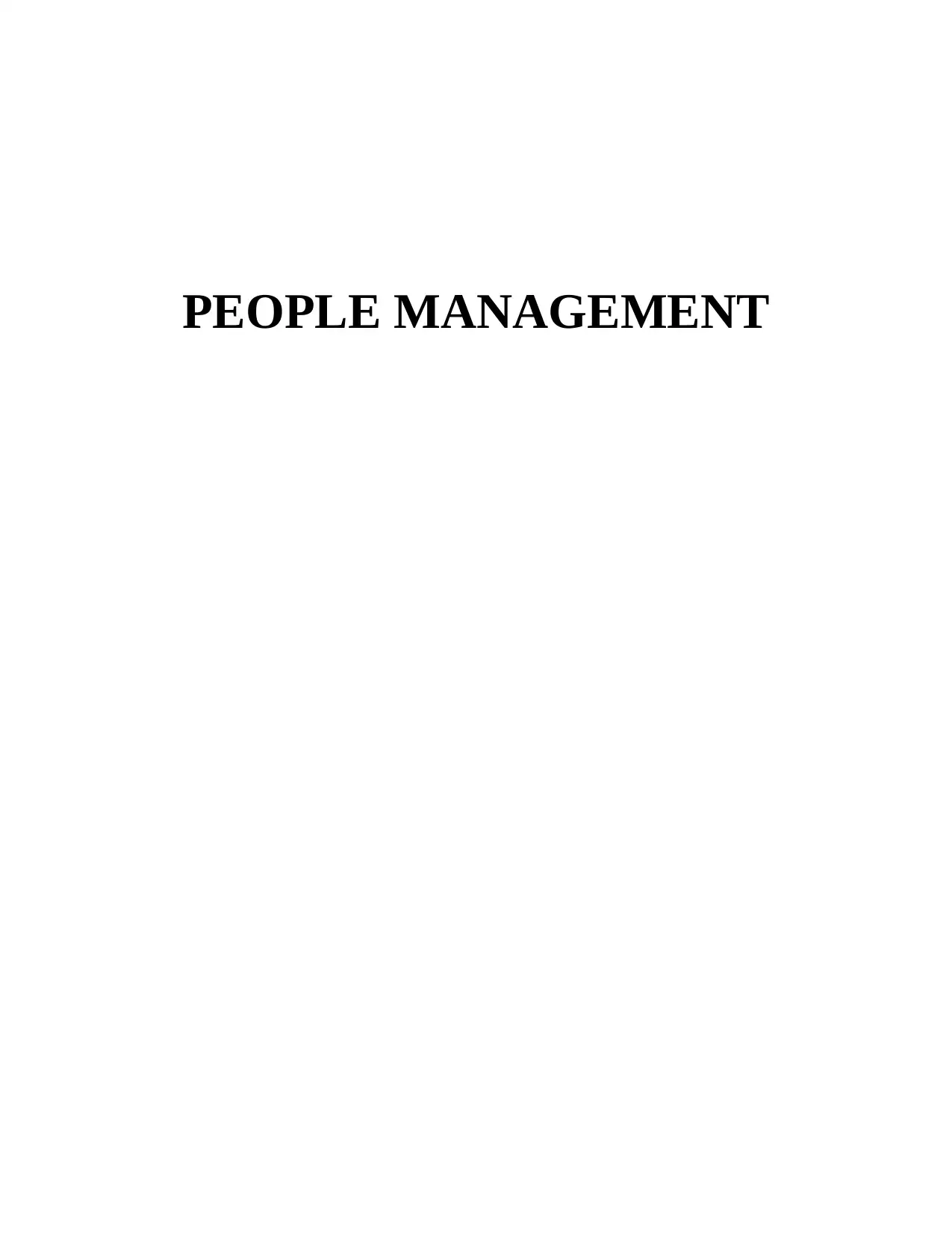
PEOPLE MANAGEMENT
Paraphrase This Document
Need a fresh take? Get an instant paraphrase of this document with our AI Paraphraser
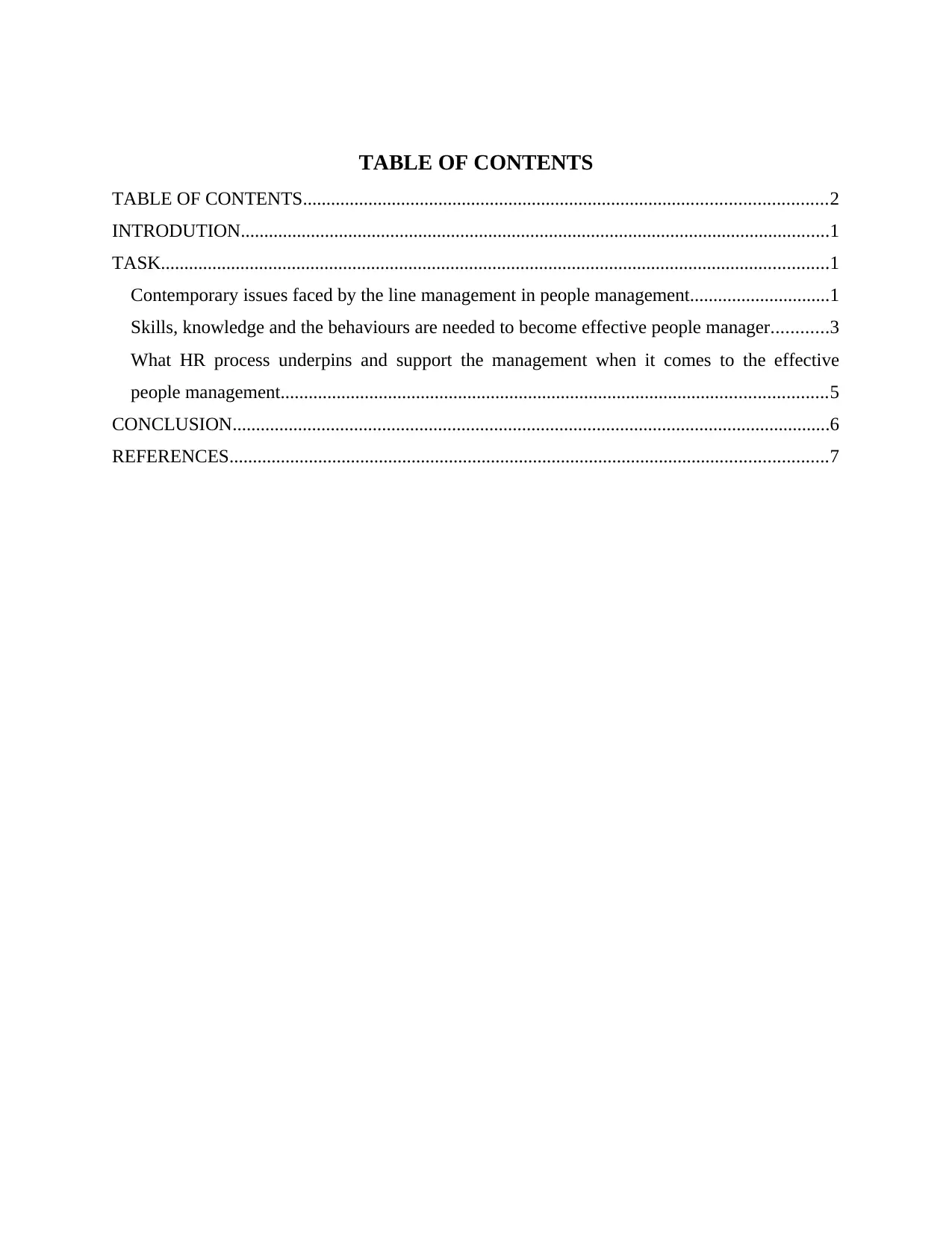
TABLE OF CONTENTS
TABLE OF CONTENTS................................................................................................................2
INTRODUTION..............................................................................................................................1
TASK...............................................................................................................................................1
Contemporary issues faced by the line management in people management..............................1
Skills, knowledge and the behaviours are needed to become effective people manager............3
What HR process underpins and support the management when it comes to the effective
people management.....................................................................................................................5
CONCLUSION................................................................................................................................6
REFERENCES................................................................................................................................7
TABLE OF CONTENTS................................................................................................................2
INTRODUTION..............................................................................................................................1
TASK...............................................................................................................................................1
Contemporary issues faced by the line management in people management..............................1
Skills, knowledge and the behaviours are needed to become effective people manager............3
What HR process underpins and support the management when it comes to the effective
people management.....................................................................................................................5
CONCLUSION................................................................................................................................6
REFERENCES................................................................................................................................7
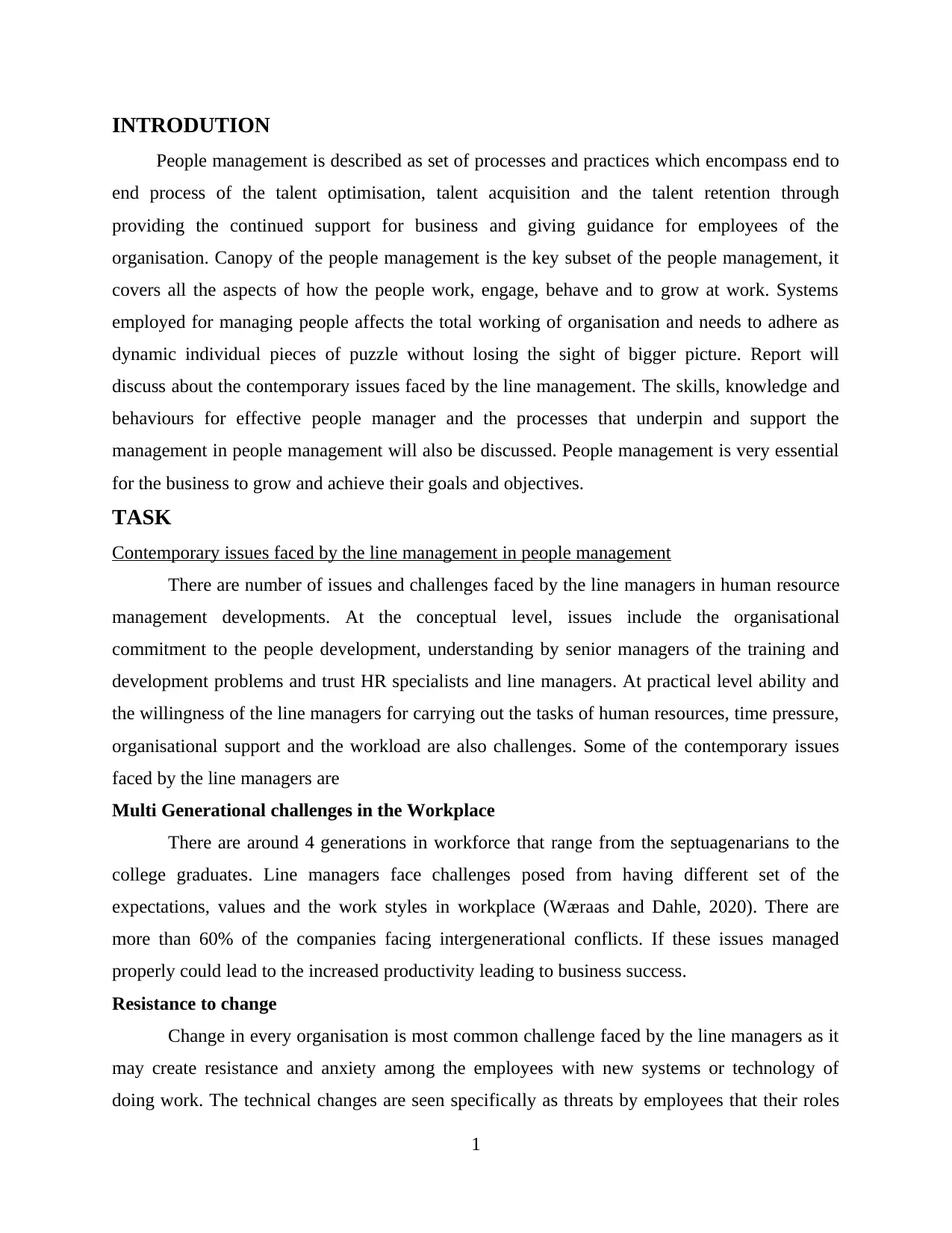
INTRODUTION
People management is described as set of processes and practices which encompass end to
end process of the talent optimisation, talent acquisition and the talent retention through
providing the continued support for business and giving guidance for employees of the
organisation. Canopy of the people management is the key subset of the people management, it
covers all the aspects of how the people work, engage, behave and to grow at work. Systems
employed for managing people affects the total working of organisation and needs to adhere as
dynamic individual pieces of puzzle without losing the sight of bigger picture. Report will
discuss about the contemporary issues faced by the line management. The skills, knowledge and
behaviours for effective people manager and the processes that underpin and support the
management in people management will also be discussed. People management is very essential
for the business to grow and achieve their goals and objectives.
TASK
Contemporary issues faced by the line management in people management
There are number of issues and challenges faced by the line managers in human resource
management developments. At the conceptual level, issues include the organisational
commitment to the people development, understanding by senior managers of the training and
development problems and trust HR specialists and line managers. At practical level ability and
the willingness of the line managers for carrying out the tasks of human resources, time pressure,
organisational support and the workload are also challenges. Some of the contemporary issues
faced by the line managers are
Multi Generational challenges in the Workplace
There are around 4 generations in workforce that range from the septuagenarians to the
college graduates. Line managers face challenges posed from having different set of the
expectations, values and the work styles in workplace (Wæraas and Dahle, 2020). There are
more than 60% of the companies facing intergenerational conflicts. If these issues managed
properly could lead to the increased productivity leading to business success.
Resistance to change
Change in every organisation is most common challenge faced by the line managers as it
may create resistance and anxiety among the employees with new systems or technology of
doing work. The technical changes are seen specifically as threats by employees that their roles
1
People management is described as set of processes and practices which encompass end to
end process of the talent optimisation, talent acquisition and the talent retention through
providing the continued support for business and giving guidance for employees of the
organisation. Canopy of the people management is the key subset of the people management, it
covers all the aspects of how the people work, engage, behave and to grow at work. Systems
employed for managing people affects the total working of organisation and needs to adhere as
dynamic individual pieces of puzzle without losing the sight of bigger picture. Report will
discuss about the contemporary issues faced by the line management. The skills, knowledge and
behaviours for effective people manager and the processes that underpin and support the
management in people management will also be discussed. People management is very essential
for the business to grow and achieve their goals and objectives.
TASK
Contemporary issues faced by the line management in people management
There are number of issues and challenges faced by the line managers in human resource
management developments. At the conceptual level, issues include the organisational
commitment to the people development, understanding by senior managers of the training and
development problems and trust HR specialists and line managers. At practical level ability and
the willingness of the line managers for carrying out the tasks of human resources, time pressure,
organisational support and the workload are also challenges. Some of the contemporary issues
faced by the line managers are
Multi Generational challenges in the Workplace
There are around 4 generations in workforce that range from the septuagenarians to the
college graduates. Line managers face challenges posed from having different set of the
expectations, values and the work styles in workplace (Wæraas and Dahle, 2020). There are
more than 60% of the companies facing intergenerational conflicts. If these issues managed
properly could lead to the increased productivity leading to business success.
Resistance to change
Change in every organisation is most common challenge faced by the line managers as it
may create resistance and anxiety among the employees with new systems or technology of
doing work. The technical changes are seen specifically as threats by employees that their roles
1
⊘ This is a preview!⊘
Do you want full access?
Subscribe today to unlock all pages.

Trusted by 1+ million students worldwide
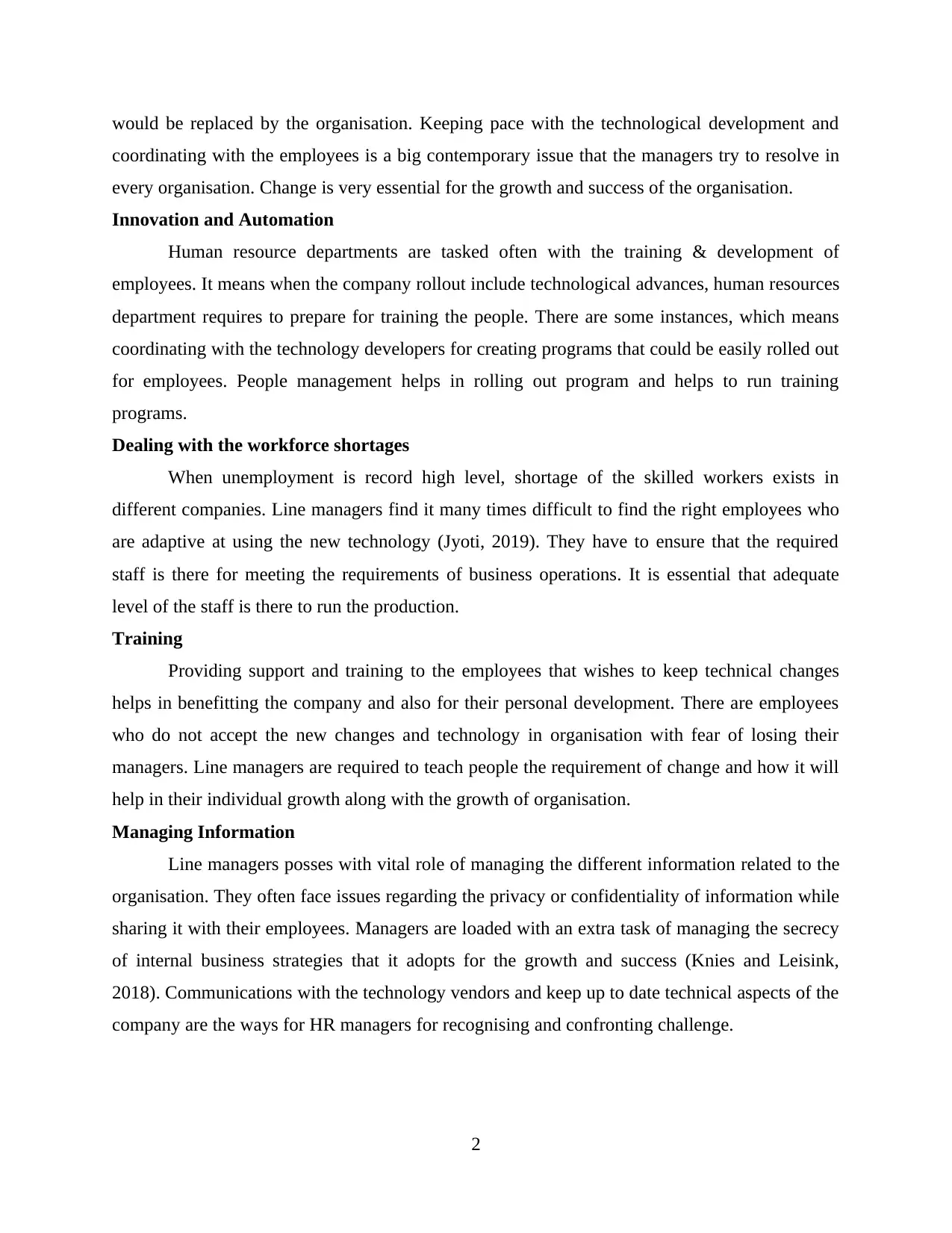
would be replaced by the organisation. Keeping pace with the technological development and
coordinating with the employees is a big contemporary issue that the managers try to resolve in
every organisation. Change is very essential for the growth and success of the organisation.
Innovation and Automation
Human resource departments are tasked often with the training & development of
employees. It means when the company rollout include technological advances, human resources
department requires to prepare for training the people. There are some instances, which means
coordinating with the technology developers for creating programs that could be easily rolled out
for employees. People management helps in rolling out program and helps to run training
programs.
Dealing with the workforce shortages
When unemployment is record high level, shortage of the skilled workers exists in
different companies. Line managers find it many times difficult to find the right employees who
are adaptive at using the new technology (Jyoti, 2019). They have to ensure that the required
staff is there for meeting the requirements of business operations. It is essential that adequate
level of the staff is there to run the production.
Training
Providing support and training to the employees that wishes to keep technical changes
helps in benefitting the company and also for their personal development. There are employees
who do not accept the new changes and technology in organisation with fear of losing their
managers. Line managers are required to teach people the requirement of change and how it will
help in their individual growth along with the growth of organisation.
Managing Information
Line managers posses with vital role of managing the different information related to the
organisation. They often face issues regarding the privacy or confidentiality of information while
sharing it with their employees. Managers are loaded with an extra task of managing the secrecy
of internal business strategies that it adopts for the growth and success (Knies and Leisink,
2018). Communications with the technology vendors and keep up to date technical aspects of the
company are the ways for HR managers for recognising and confronting challenge.
2
coordinating with the employees is a big contemporary issue that the managers try to resolve in
every organisation. Change is very essential for the growth and success of the organisation.
Innovation and Automation
Human resource departments are tasked often with the training & development of
employees. It means when the company rollout include technological advances, human resources
department requires to prepare for training the people. There are some instances, which means
coordinating with the technology developers for creating programs that could be easily rolled out
for employees. People management helps in rolling out program and helps to run training
programs.
Dealing with the workforce shortages
When unemployment is record high level, shortage of the skilled workers exists in
different companies. Line managers find it many times difficult to find the right employees who
are adaptive at using the new technology (Jyoti, 2019). They have to ensure that the required
staff is there for meeting the requirements of business operations. It is essential that adequate
level of the staff is there to run the production.
Training
Providing support and training to the employees that wishes to keep technical changes
helps in benefitting the company and also for their personal development. There are employees
who do not accept the new changes and technology in organisation with fear of losing their
managers. Line managers are required to teach people the requirement of change and how it will
help in their individual growth along with the growth of organisation.
Managing Information
Line managers posses with vital role of managing the different information related to the
organisation. They often face issues regarding the privacy or confidentiality of information while
sharing it with their employees. Managers are loaded with an extra task of managing the secrecy
of internal business strategies that it adopts for the growth and success (Knies and Leisink,
2018). Communications with the technology vendors and keep up to date technical aspects of the
company are the ways for HR managers for recognising and confronting challenge.
2
Paraphrase This Document
Need a fresh take? Get an instant paraphrase of this document with our AI Paraphraser
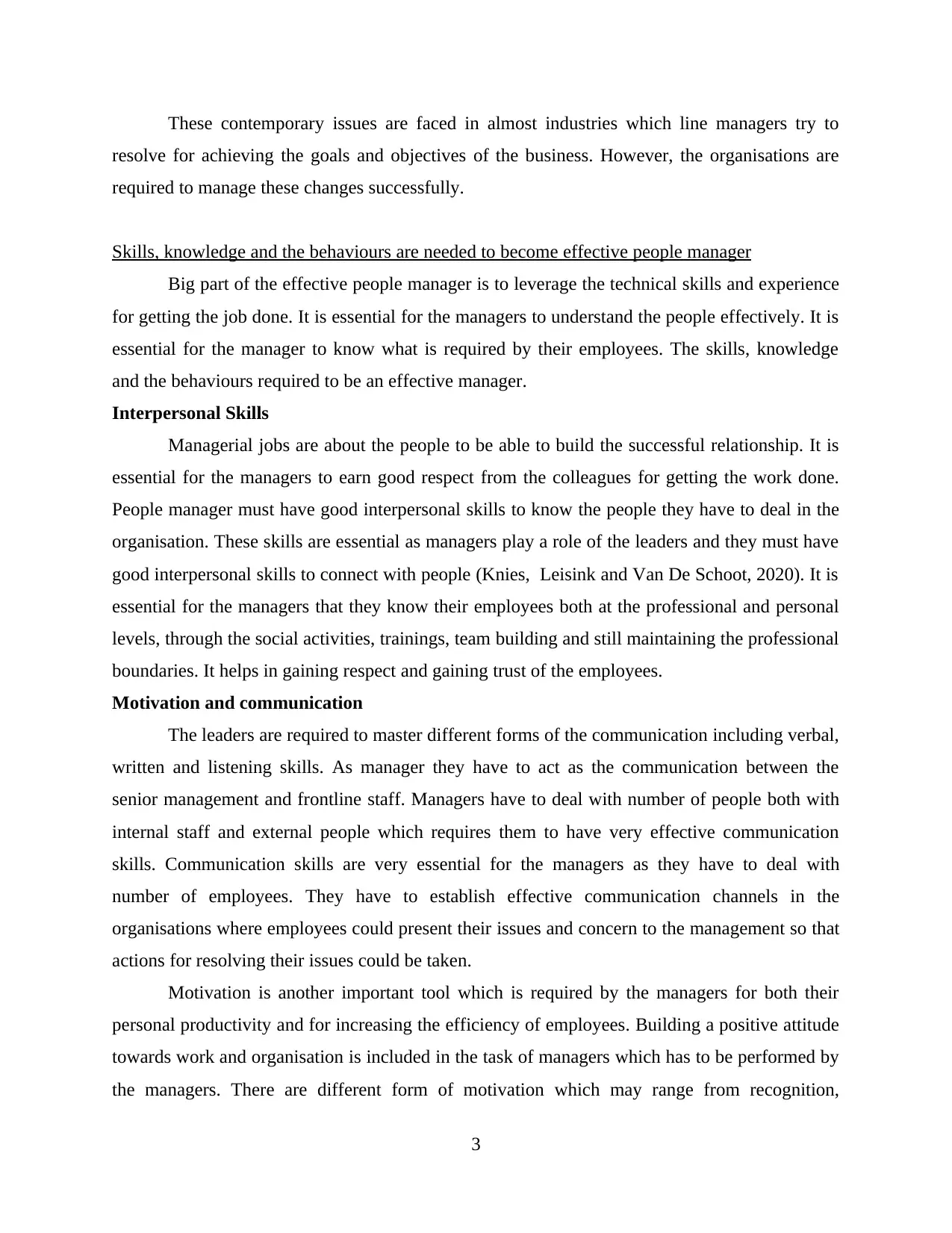
These contemporary issues are faced in almost industries which line managers try to
resolve for achieving the goals and objectives of the business. However, the organisations are
required to manage these changes successfully.
Skills, knowledge and the behaviours are needed to become effective people manager
Big part of the effective people manager is to leverage the technical skills and experience
for getting the job done. It is essential for the managers to understand the people effectively. It is
essential for the manager to know what is required by their employees. The skills, knowledge
and the behaviours required to be an effective manager.
Interpersonal Skills
Managerial jobs are about the people to be able to build the successful relationship. It is
essential for the managers to earn good respect from the colleagues for getting the work done.
People manager must have good interpersonal skills to know the people they have to deal in the
organisation. These skills are essential as managers play a role of the leaders and they must have
good interpersonal skills to connect with people (Knies, Leisink and Van De Schoot, 2020). It is
essential for the managers that they know their employees both at the professional and personal
levels, through the social activities, trainings, team building and still maintaining the professional
boundaries. It helps in gaining respect and gaining trust of the employees.
Motivation and communication
The leaders are required to master different forms of the communication including verbal,
written and listening skills. As manager they have to act as the communication between the
senior management and frontline staff. Managers have to deal with number of people both with
internal staff and external people which requires them to have very effective communication
skills. Communication skills are very essential for the managers as they have to deal with
number of employees. They have to establish effective communication channels in the
organisations where employees could present their issues and concern to the management so that
actions for resolving their issues could be taken.
Motivation is another important tool which is required by the managers for both their
personal productivity and for increasing the efficiency of employees. Building a positive attitude
towards work and organisation is included in the task of managers which has to be performed by
the managers. There are different form of motivation which may range from recognition,
3
resolve for achieving the goals and objectives of the business. However, the organisations are
required to manage these changes successfully.
Skills, knowledge and the behaviours are needed to become effective people manager
Big part of the effective people manager is to leverage the technical skills and experience
for getting the job done. It is essential for the managers to understand the people effectively. It is
essential for the manager to know what is required by their employees. The skills, knowledge
and the behaviours required to be an effective manager.
Interpersonal Skills
Managerial jobs are about the people to be able to build the successful relationship. It is
essential for the managers to earn good respect from the colleagues for getting the work done.
People manager must have good interpersonal skills to know the people they have to deal in the
organisation. These skills are essential as managers play a role of the leaders and they must have
good interpersonal skills to connect with people (Knies, Leisink and Van De Schoot, 2020). It is
essential for the managers that they know their employees both at the professional and personal
levels, through the social activities, trainings, team building and still maintaining the professional
boundaries. It helps in gaining respect and gaining trust of the employees.
Motivation and communication
The leaders are required to master different forms of the communication including verbal,
written and listening skills. As manager they have to act as the communication between the
senior management and frontline staff. Managers have to deal with number of people both with
internal staff and external people which requires them to have very effective communication
skills. Communication skills are very essential for the managers as they have to deal with
number of employees. They have to establish effective communication channels in the
organisations where employees could present their issues and concern to the management so that
actions for resolving their issues could be taken.
Motivation is another important tool which is required by the managers for both their
personal productivity and for increasing the efficiency of employees. Building a positive attitude
towards work and organisation is included in the task of managers which has to be performed by
the managers. There are different form of motivation which may range from recognition,
3
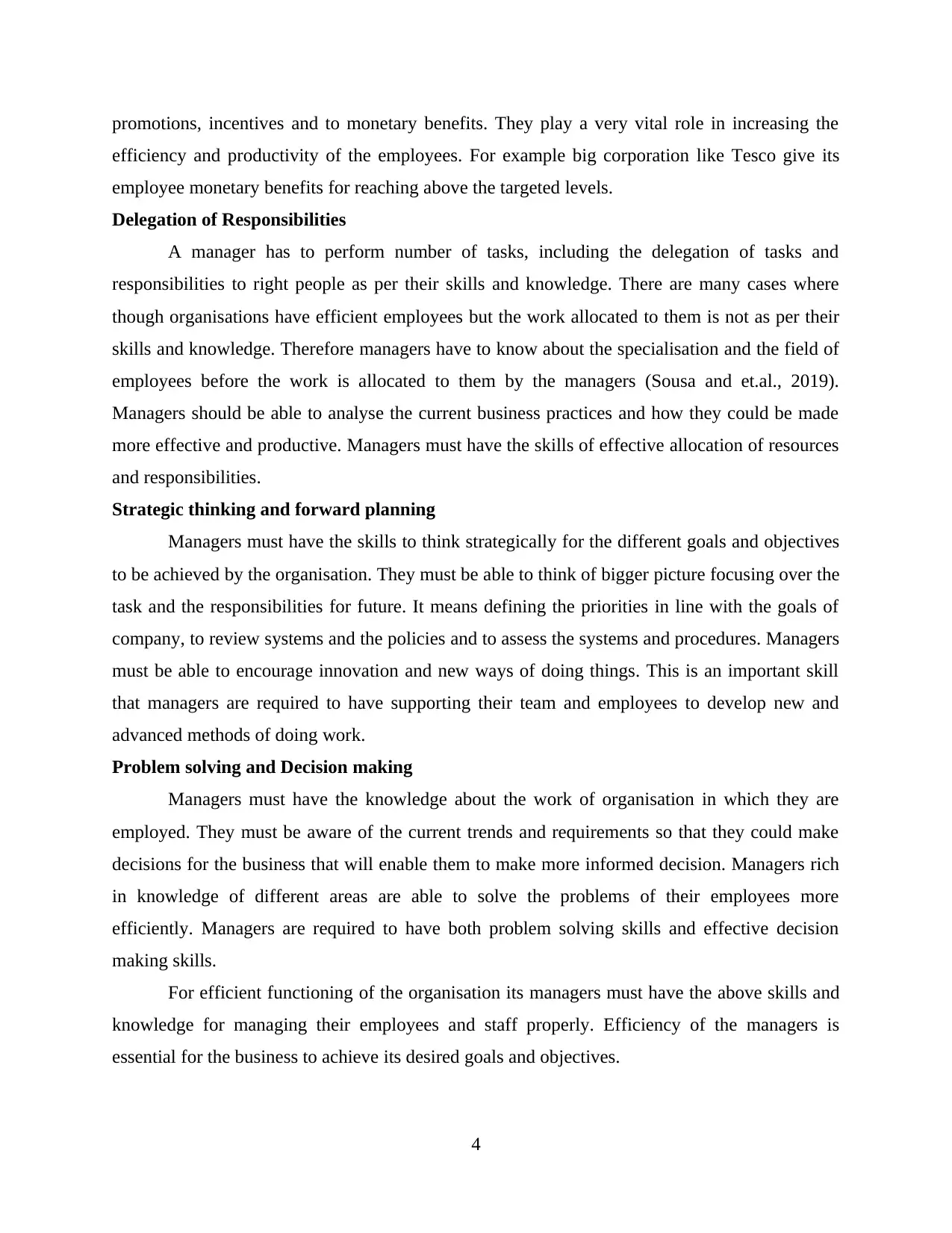
promotions, incentives and to monetary benefits. They play a very vital role in increasing the
efficiency and productivity of the employees. For example big corporation like Tesco give its
employee monetary benefits for reaching above the targeted levels.
Delegation of Responsibilities
A manager has to perform number of tasks, including the delegation of tasks and
responsibilities to right people as per their skills and knowledge. There are many cases where
though organisations have efficient employees but the work allocated to them is not as per their
skills and knowledge. Therefore managers have to know about the specialisation and the field of
employees before the work is allocated to them by the managers (Sousa and et.al., 2019).
Managers should be able to analyse the current business practices and how they could be made
more effective and productive. Managers must have the skills of effective allocation of resources
and responsibilities.
Strategic thinking and forward planning
Managers must have the skills to think strategically for the different goals and objectives
to be achieved by the organisation. They must be able to think of bigger picture focusing over the
task and the responsibilities for future. It means defining the priorities in line with the goals of
company, to review systems and the policies and to assess the systems and procedures. Managers
must be able to encourage innovation and new ways of doing things. This is an important skill
that managers are required to have supporting their team and employees to develop new and
advanced methods of doing work.
Problem solving and Decision making
Managers must have the knowledge about the work of organisation in which they are
employed. They must be aware of the current trends and requirements so that they could make
decisions for the business that will enable them to make more informed decision. Managers rich
in knowledge of different areas are able to solve the problems of their employees more
efficiently. Managers are required to have both problem solving skills and effective decision
making skills.
For efficient functioning of the organisation its managers must have the above skills and
knowledge for managing their employees and staff properly. Efficiency of the managers is
essential for the business to achieve its desired goals and objectives.
4
efficiency and productivity of the employees. For example big corporation like Tesco give its
employee monetary benefits for reaching above the targeted levels.
Delegation of Responsibilities
A manager has to perform number of tasks, including the delegation of tasks and
responsibilities to right people as per their skills and knowledge. There are many cases where
though organisations have efficient employees but the work allocated to them is not as per their
skills and knowledge. Therefore managers have to know about the specialisation and the field of
employees before the work is allocated to them by the managers (Sousa and et.al., 2019).
Managers should be able to analyse the current business practices and how they could be made
more effective and productive. Managers must have the skills of effective allocation of resources
and responsibilities.
Strategic thinking and forward planning
Managers must have the skills to think strategically for the different goals and objectives
to be achieved by the organisation. They must be able to think of bigger picture focusing over the
task and the responsibilities for future. It means defining the priorities in line with the goals of
company, to review systems and the policies and to assess the systems and procedures. Managers
must be able to encourage innovation and new ways of doing things. This is an important skill
that managers are required to have supporting their team and employees to develop new and
advanced methods of doing work.
Problem solving and Decision making
Managers must have the knowledge about the work of organisation in which they are
employed. They must be aware of the current trends and requirements so that they could make
decisions for the business that will enable them to make more informed decision. Managers rich
in knowledge of different areas are able to solve the problems of their employees more
efficiently. Managers are required to have both problem solving skills and effective decision
making skills.
For efficient functioning of the organisation its managers must have the above skills and
knowledge for managing their employees and staff properly. Efficiency of the managers is
essential for the business to achieve its desired goals and objectives.
4
⊘ This is a preview!⊘
Do you want full access?
Subscribe today to unlock all pages.

Trusted by 1+ million students worldwide
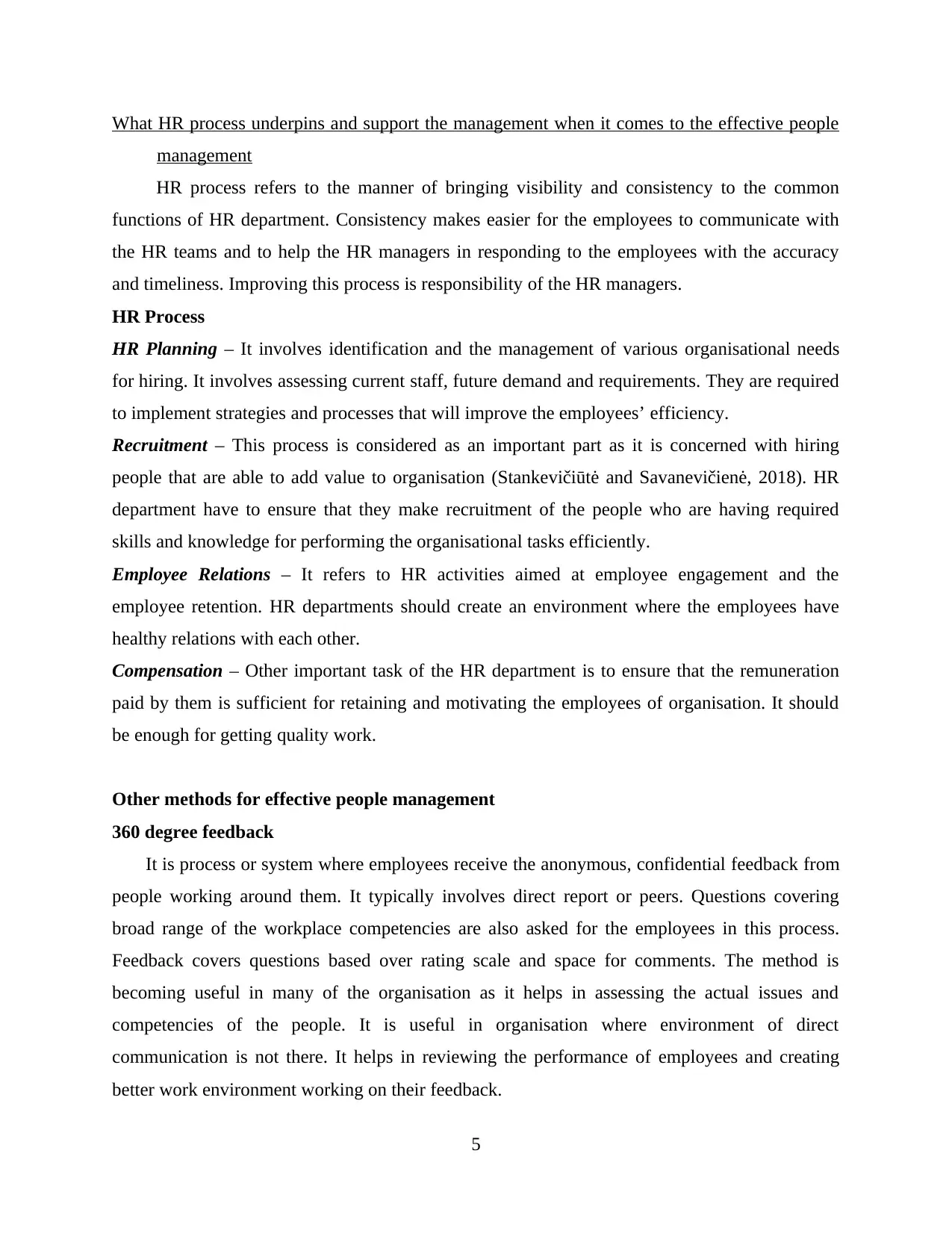
What HR process underpins and support the management when it comes to the effective people
management
HR process refers to the manner of bringing visibility and consistency to the common
functions of HR department. Consistency makes easier for the employees to communicate with
the HR teams and to help the HR managers in responding to the employees with the accuracy
and timeliness. Improving this process is responsibility of the HR managers.
HR Process
HR Planning – It involves identification and the management of various organisational needs
for hiring. It involves assessing current staff, future demand and requirements. They are required
to implement strategies and processes that will improve the employees’ efficiency.
Recruitment – This process is considered as an important part as it is concerned with hiring
people that are able to add value to organisation (Stankevičiūtė and Savanevičienė, 2018). HR
department have to ensure that they make recruitment of the people who are having required
skills and knowledge for performing the organisational tasks efficiently.
Employee Relations – It refers to HR activities aimed at employee engagement and the
employee retention. HR departments should create an environment where the employees have
healthy relations with each other.
Compensation – Other important task of the HR department is to ensure that the remuneration
paid by them is sufficient for retaining and motivating the employees of organisation. It should
be enough for getting quality work.
Other methods for effective people management
360 degree feedback
It is process or system where employees receive the anonymous, confidential feedback from
people working around them. It typically involves direct report or peers. Questions covering
broad range of the workplace competencies are also asked for the employees in this process.
Feedback covers questions based over rating scale and space for comments. The method is
becoming useful in many of the organisation as it helps in assessing the actual issues and
competencies of the people. It is useful in organisation where environment of direct
communication is not there. It helps in reviewing the performance of employees and creating
better work environment working on their feedback.
5
management
HR process refers to the manner of bringing visibility and consistency to the common
functions of HR department. Consistency makes easier for the employees to communicate with
the HR teams and to help the HR managers in responding to the employees with the accuracy
and timeliness. Improving this process is responsibility of the HR managers.
HR Process
HR Planning – It involves identification and the management of various organisational needs
for hiring. It involves assessing current staff, future demand and requirements. They are required
to implement strategies and processes that will improve the employees’ efficiency.
Recruitment – This process is considered as an important part as it is concerned with hiring
people that are able to add value to organisation (Stankevičiūtė and Savanevičienė, 2018). HR
department have to ensure that they make recruitment of the people who are having required
skills and knowledge for performing the organisational tasks efficiently.
Employee Relations – It refers to HR activities aimed at employee engagement and the
employee retention. HR departments should create an environment where the employees have
healthy relations with each other.
Compensation – Other important task of the HR department is to ensure that the remuneration
paid by them is sufficient for retaining and motivating the employees of organisation. It should
be enough for getting quality work.
Other methods for effective people management
360 degree feedback
It is process or system where employees receive the anonymous, confidential feedback from
people working around them. It typically involves direct report or peers. Questions covering
broad range of the workplace competencies are also asked for the employees in this process.
Feedback covers questions based over rating scale and space for comments. The method is
becoming useful in many of the organisation as it helps in assessing the actual issues and
competencies of the people. It is useful in organisation where environment of direct
communication is not there. It helps in reviewing the performance of employees and creating
better work environment working on their feedback.
5
Paraphrase This Document
Need a fresh take? Get an instant paraphrase of this document with our AI Paraphraser
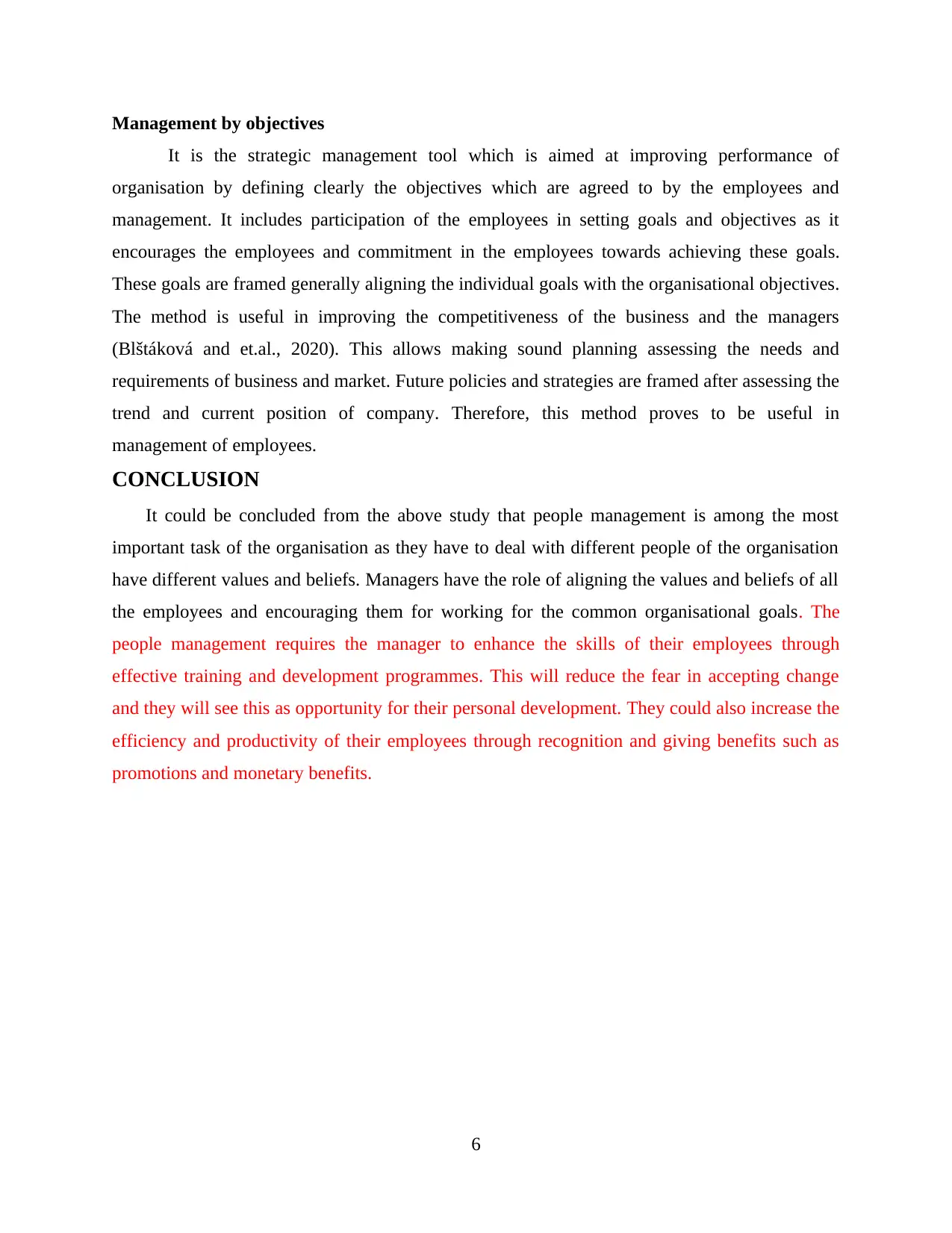
Management by objectives
It is the strategic management tool which is aimed at improving performance of
organisation by defining clearly the objectives which are agreed to by the employees and
management. It includes participation of the employees in setting goals and objectives as it
encourages the employees and commitment in the employees towards achieving these goals.
These goals are framed generally aligning the individual goals with the organisational objectives.
The method is useful in improving the competitiveness of the business and the managers
(Blštáková and et.al., 2020). This allows making sound planning assessing the needs and
requirements of business and market. Future policies and strategies are framed after assessing the
trend and current position of company. Therefore, this method proves to be useful in
management of employees.
CONCLUSION
It could be concluded from the above study that people management is among the most
important task of the organisation as they have to deal with different people of the organisation
have different values and beliefs. Managers have the role of aligning the values and beliefs of all
the employees and encouraging them for working for the common organisational goals. The
people management requires the manager to enhance the skills of their employees through
effective training and development programmes. This will reduce the fear in accepting change
and they will see this as opportunity for their personal development. They could also increase the
efficiency and productivity of their employees through recognition and giving benefits such as
promotions and monetary benefits.
6
It is the strategic management tool which is aimed at improving performance of
organisation by defining clearly the objectives which are agreed to by the employees and
management. It includes participation of the employees in setting goals and objectives as it
encourages the employees and commitment in the employees towards achieving these goals.
These goals are framed generally aligning the individual goals with the organisational objectives.
The method is useful in improving the competitiveness of the business and the managers
(Blštáková and et.al., 2020). This allows making sound planning assessing the needs and
requirements of business and market. Future policies and strategies are framed after assessing the
trend and current position of company. Therefore, this method proves to be useful in
management of employees.
CONCLUSION
It could be concluded from the above study that people management is among the most
important task of the organisation as they have to deal with different people of the organisation
have different values and beliefs. Managers have the role of aligning the values and beliefs of all
the employees and encouraging them for working for the common organisational goals. The
people management requires the manager to enhance the skills of their employees through
effective training and development programmes. This will reduce the fear in accepting change
and they will see this as opportunity for their personal development. They could also increase the
efficiency and productivity of their employees through recognition and giving benefits such as
promotions and monetary benefits.
6
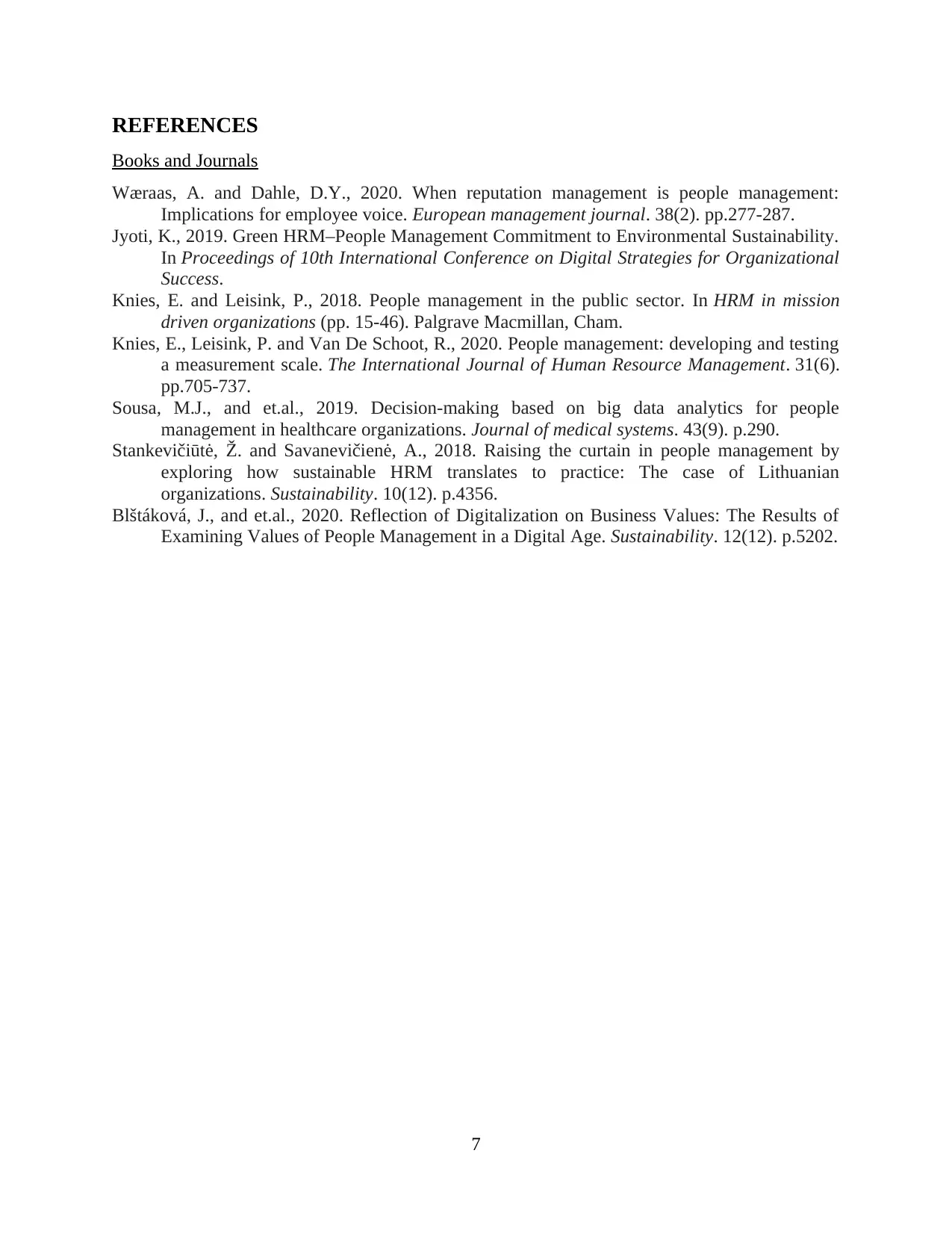
REFERENCES
Books and Journals
Wæraas, A. and Dahle, D.Y., 2020. When reputation management is people management:
Implications for employee voice. European management journal. 38(2). pp.277-287.
Jyoti, K., 2019. Green HRM–People Management Commitment to Environmental Sustainability.
In Proceedings of 10th International Conference on Digital Strategies for Organizational
Success.
Knies, E. and Leisink, P., 2018. People management in the public sector. In HRM in mission
driven organizations (pp. 15-46). Palgrave Macmillan, Cham.
Knies, E., Leisink, P. and Van De Schoot, R., 2020. People management: developing and testing
a measurement scale. The International Journal of Human Resource Management. 31(6).
pp.705-737.
Sousa, M.J., and et.al., 2019. Decision-making based on big data analytics for people
management in healthcare organizations. Journal of medical systems. 43(9). p.290.
Stankevičiūtė, Ž. and Savanevičienė, A., 2018. Raising the curtain in people management by
exploring how sustainable HRM translates to practice: The case of Lithuanian
organizations. Sustainability. 10(12). p.4356.
Blštáková, J., and et.al., 2020. Reflection of Digitalization on Business Values: The Results of
Examining Values of People Management in a Digital Age. Sustainability. 12(12). p.5202.
7
Books and Journals
Wæraas, A. and Dahle, D.Y., 2020. When reputation management is people management:
Implications for employee voice. European management journal. 38(2). pp.277-287.
Jyoti, K., 2019. Green HRM–People Management Commitment to Environmental Sustainability.
In Proceedings of 10th International Conference on Digital Strategies for Organizational
Success.
Knies, E. and Leisink, P., 2018. People management in the public sector. In HRM in mission
driven organizations (pp. 15-46). Palgrave Macmillan, Cham.
Knies, E., Leisink, P. and Van De Schoot, R., 2020. People management: developing and testing
a measurement scale. The International Journal of Human Resource Management. 31(6).
pp.705-737.
Sousa, M.J., and et.al., 2019. Decision-making based on big data analytics for people
management in healthcare organizations. Journal of medical systems. 43(9). p.290.
Stankevičiūtė, Ž. and Savanevičienė, A., 2018. Raising the curtain in people management by
exploring how sustainable HRM translates to practice: The case of Lithuanian
organizations. Sustainability. 10(12). p.4356.
Blštáková, J., and et.al., 2020. Reflection of Digitalization on Business Values: The Results of
Examining Values of People Management in a Digital Age. Sustainability. 12(12). p.5202.
7
⊘ This is a preview!⊘
Do you want full access?
Subscribe today to unlock all pages.

Trusted by 1+ million students worldwide
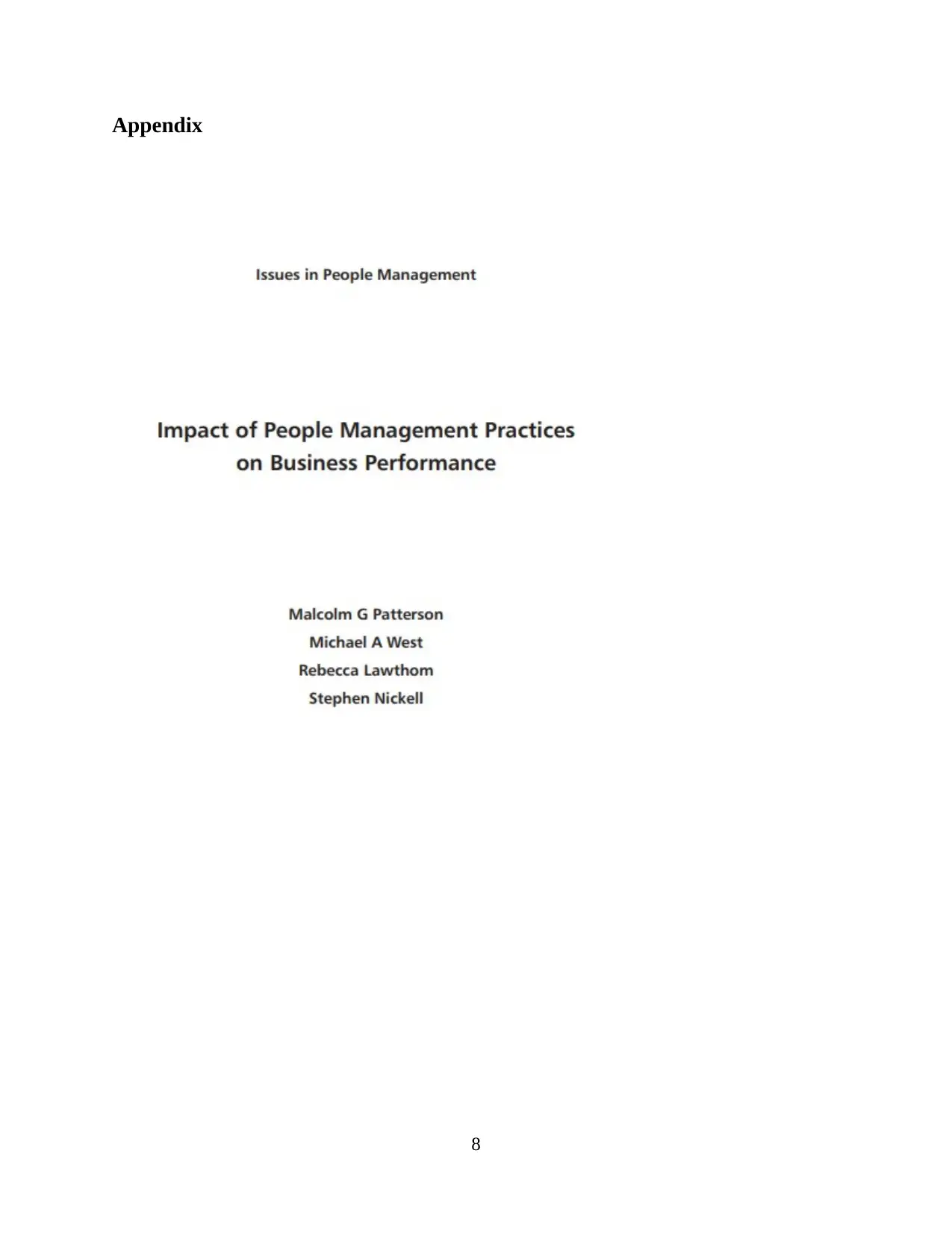
Appendix
8
8
Paraphrase This Document
Need a fresh take? Get an instant paraphrase of this document with our AI Paraphraser
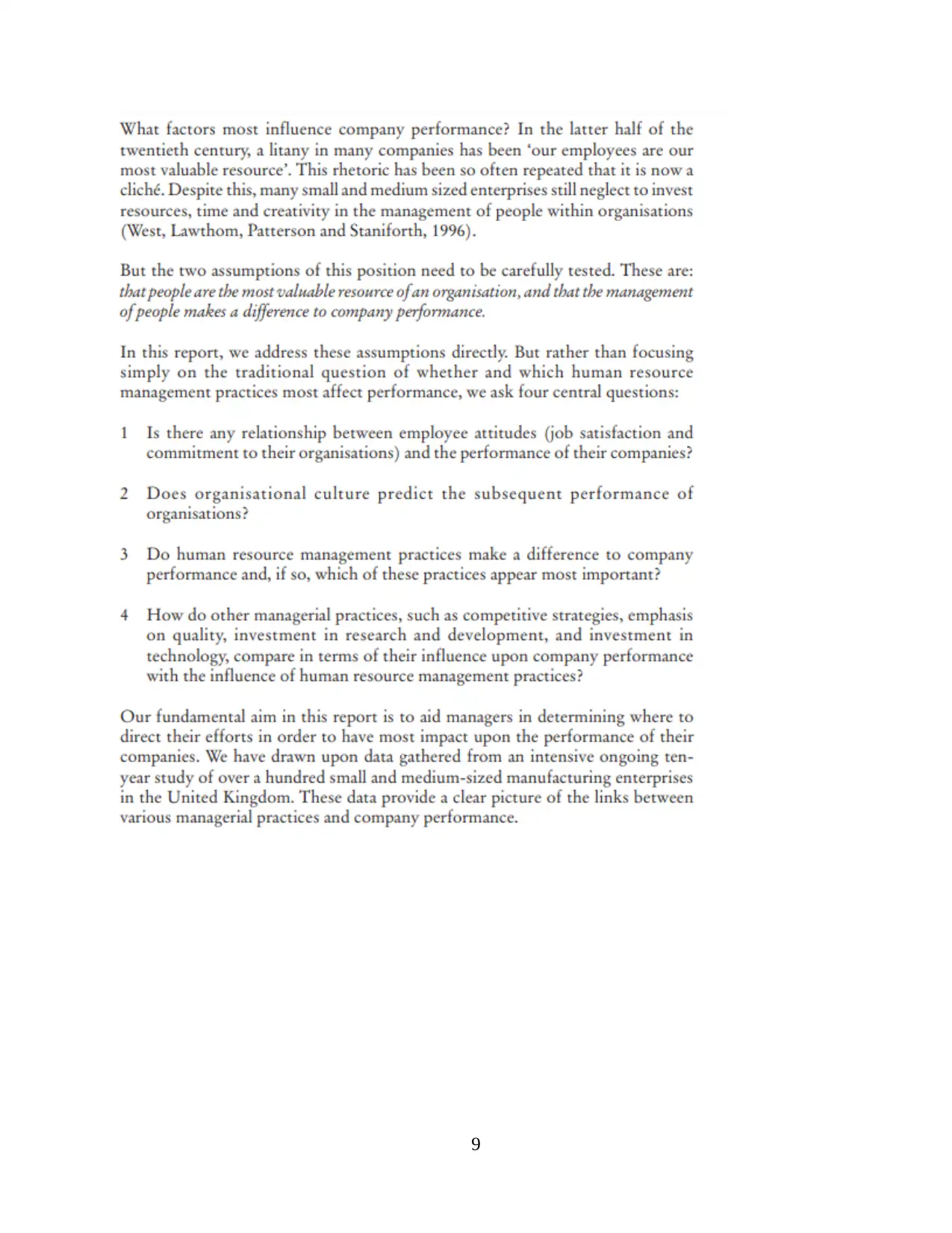
9
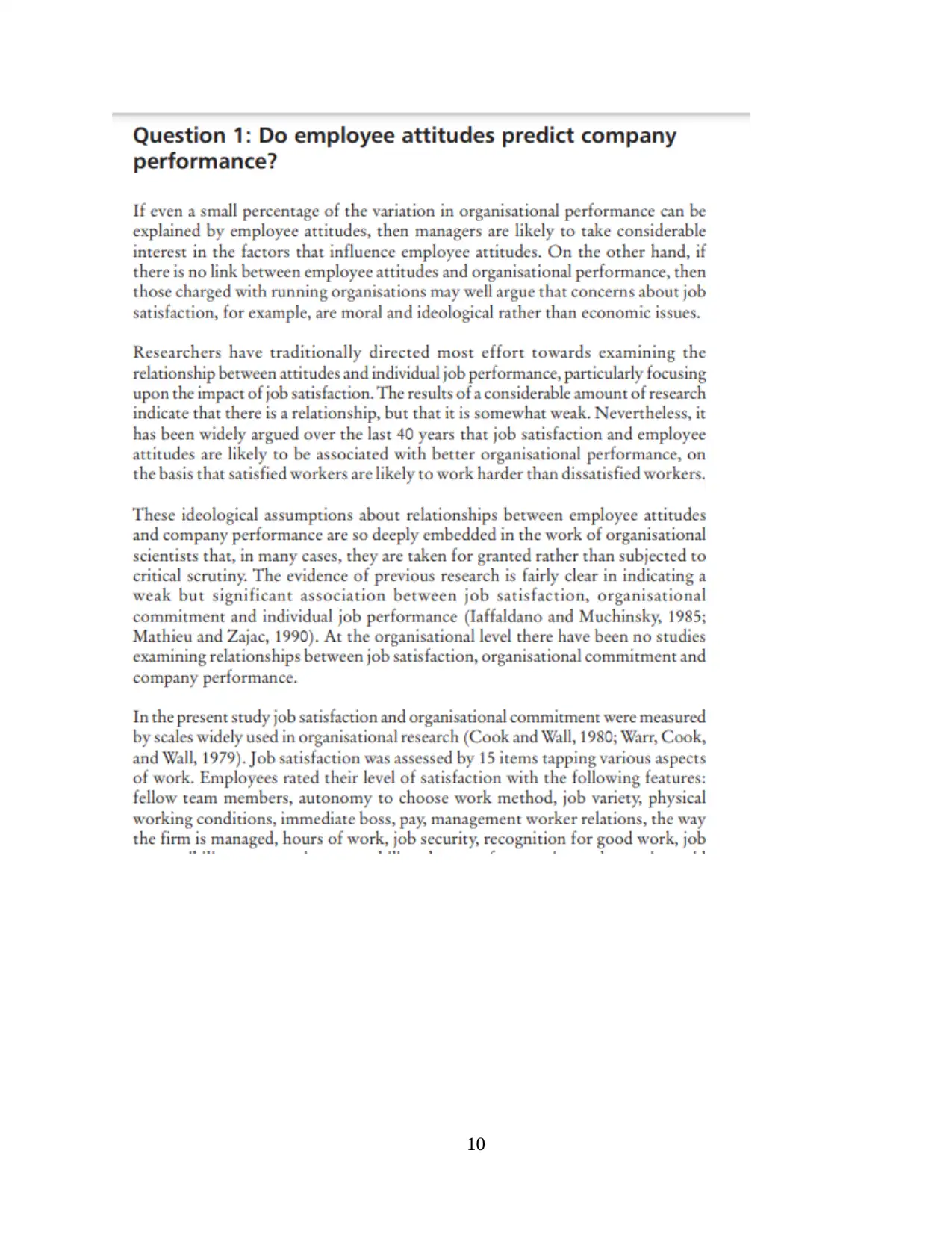
10
⊘ This is a preview!⊘
Do you want full access?
Subscribe today to unlock all pages.

Trusted by 1+ million students worldwide
1 out of 13
Related Documents
Your All-in-One AI-Powered Toolkit for Academic Success.
+13062052269
info@desklib.com
Available 24*7 on WhatsApp / Email
![[object Object]](/_next/static/media/star-bottom.7253800d.svg)
Unlock your academic potential
Copyright © 2020–2026 A2Z Services. All Rights Reserved. Developed and managed by ZUCOL.





